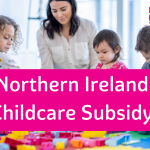Education Minister confirms childcare is a top priority and work is progressing on interim financial support for the sector
Education Minister Paul Givan, MLA attended the meeting of the Assembly’s Education Committee yesterday (Wednesday 20 March 2024) to provide an update on education issues, including childcare. As expected, there was significant interest from MLAs in the Minister’s briefing on how his department is addressing the issues facing families and the childcare sector.
The Minister reconfirmed that development of a new Early Learning and Childcare Strategy is a top priority for him, and that his officials are working “at pace” to develop a strategy that will benefit children, families and society more broadly, looking at approaches from elsewhere but with a view to developing a bespoke model of support, that meets local needs. He stressed that this needs to be evidence-based and deliver value for money and that it will take time to deliver. He reiterated the figure of £400 million that had been previously presented as an outline of the investment required, but suggested it may require additional funding, depending on the level of support provided and the eligibility criteria.
Importantly, in light of pressure from Employers For Childcare, the childcare sector and parent support groups, he also confirmed that the department is looking at short term and interim support measures. We, and others, have been highlighting the critical issues facing families and childcare providers, particularly in light of the increase to the National Living and Minimum Wage from next month, which is contributing to further unaffordable increases in childcare fees.
Just this week we published new research which shows that 73% of childcare providers in Northern Ireland have either increased their fees since the start of the year, or plan to do so before the end of June, with the average increase being 14%. The pulse survey also found that almost half of childcare providers (46%) describing their financial situation as “struggling” or “distressed” indicating the precarious state of the sector, which is so critical to our economy and society. This figure rises even further to 60% of day nurseries who are either focused on survival over the next 12 months or at immediate risk of closure.
The Minister stressed that stabilising the early years sector, including Sure Start, was an early priority and that, subject to getting funding from the Executive, he is planning to move ahead with expansion of the pre-school education programme, standardising provision for all children to 22.5 hours.
Questions from MLAs
Following his update, the Minister answered questions from a number of MLAs.
Nick Mathison: asked about how the Minister is working to ensure meaningful, collaborative working across departments, including the pooling of resources, to deliver on ambition and address challenges.
Response from Minister: In his response, the Minister advised he has taken a paper to the Executive securing the establishment of a Task and Finish Group with officials from across all Departments to support the development of the new Early learning and Childcare Strategy.
Cathy Mason: Welcomed the priority given to early learning and childcare, but noted the feeling coming from the sector is that there is not enough urgency. The sector has been waiting a long time for support. Cathy also welcomed the commitment to a bespoke model and asked from some indication of what that will look like. She referred to Employers For Childcare’s presentation to the Committee (on 28 February 2024) setting out the shortcomings of the 30 hours scheme in England. She noted the All Party Group has heard evidence on the positives and negatives of various models and asked for more information on the models being explored. She also asked about the cross-departmental group – what is its urgency, has it met yet and what will the priorities be?
Response from Minister: The Minister responded by saying the Task and Finish Group will cover a wide range of issues including affordable childcare and early years. His department is also scoping the standardisation of pre-school to 22.5 hours as a first step (even ultimately up to 30 hours “within those settings”). They have been doing capacity research with providers and information will be made publicly available “in due course”. The Minister also raised the importance of stabilisation of the early years sector and Sure Start, building upon strengths, and is looking at rolling out Sure Start to other areas.
The Minister also advised he has engaged with Treasury on increasing the 20% Tax-Free Childcare allowance.
Work with officials around interim support measures is ongoing and he suggested that they hope to be looking at measures shortly after Easter.
On collaboration, the Minister stressed that he will be engaging with other Ministerial colleagues and that stakeholder engagement has been taking place, and will continue to be important. He has already visited some Sure Starts and plans to go to other providers. He again outlined that he hoped to provide something more definitive after Easter.
Kate Nicholl: Welcomed the commitment from the Minister, but expressed concern that there is still no timeline for either short term interventions or the longer-term strategy. She also pointed out that the expansion of pre-school is not the same as childcare and asked what other first options are being looked at. She also asked about the costing, not just of childcare options, but also the cost of not investing.
Response from Minister: The Minister again confirmed he has asked officials to look at the affordability piece, part of that is about providing financial support and that he hopes to have detail shortly after Easter. The Task and Finish Group will be looking at interim support measures and the longer term Strategy. He agreed that support for childcare should be seen as investment rather than a cost. He also agreed about the importance of recognising the need for support not just for children of pre-school age – early intervention means not waiting until 3-4 years.
Conclusion
This was a welcome update from the Education Minister and demonstrates that he is aware of the challenges facing families and the childcare sector, and that childcare is a top priority for him and his departmental officials. We, and others, recognise that it will take time to develop the new long-term Early Education and Childcare Strategy – this is a once in a generation opportunity and it needs to be done right, to deliver support that meets the needs of families and the childcare sector here, learning from the experiences from elsewhere. However, we do need to see a timeline so that families and all sectoral stakeholders have an expectation of when the Strategy will be implemented and so that the Minister, and his department, can be held to account.
We remain concerned at the lack of progress towards delivery of a package of interim financial support. Our latest research shows that both families and the childcare sector are struggling now – they cannot afford to wait any longer for much-needed support. Childcare settings are already closing and parents are already leaving the workplace as a result of inability to afford the childcare they need. There must be increased urgency around this, and a firm commitment for when support will be made available. With 60% of day nurseries saying they are either focused on survival over the next 12 months or at immediate risk of closure, this is a crisis that needs immediate intervention.
Lastly, while we very much welcome the standardisation of the pre-school education programme to 22.5 hours for all children, we would again reiterate that this is not childcare. While it delivers significant developmental benefits to children, it has not been designed to support parental employment. For many families, it actually costs more for their children to access the ‘free’ pre-school hours, when they factor in wraparound childcare and transport costs, as well as ‘add ons’ for snacks, lunches and resources. This is also only for three and four year olds – in England, when 30 hours free childcare was introduced for this age group, due to insufficient funding, it resulted in higher fees for younger children.
We know that childcare is most expensive for families with the youngest children, and presents a significant barrier to parents returning to work after parental leave. We need to see a model of financial support that delivers for all families, whatever age their children are – this has the potential to deliver significant long-term benefits, both in terms of early intervention / child development and parental employment. Read our proposals for a model of support that tackles disadvantage by providing support with childcare for all families here.






